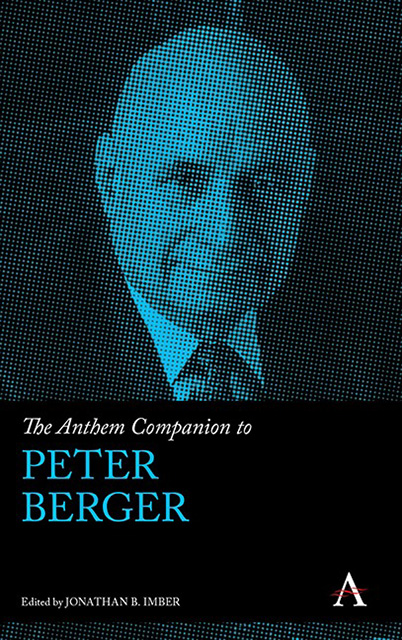Book contents
- Frontmatter
- Contents
- Introduction
- Chapter 1 Plurality, Choice, and The Dynamics of Doubt
- Chapter 2 Peter L. Berger and The Challenge of Modern Pluralism
- Chapter 3 Making Peace With Pluralism In America
- Chapter 4 Religion and Secularity in A Desecularizing Russia
- Chapter 5 The Moral Limits of Religious Pluralism
- Chapter 6 Peter L. Berger and Arnold Gehlen: Secularization, Institutions and Social Order
- Chapter 7 Peter L. Berger’s Three Religions
- Chapter 8 Objectivation: The Material Heritage of Peter L. Berger
- Chapter 9 Peter L. Berger’s The Social Construction of Reality
- Chapter 10 The Untaken Road to Phenomenological Sociology
- Chapter 11 Cheering for Capitalism
- Chapter 12 Peter L. Berger and Economic Sociology
- Chapter 13 Peter L. Berger Changed The Direction of My Work … and My Life
- Chapter 14 Peter L. Berger On Religion as Choice Rather Than Fate
- List of Contributors
- Index
Chapter 11 - Cheering for Capitalism
Published online by Cambridge University Press: 17 October 2023
- Frontmatter
- Contents
- Introduction
- Chapter 1 Plurality, Choice, and The Dynamics of Doubt
- Chapter 2 Peter L. Berger and The Challenge of Modern Pluralism
- Chapter 3 Making Peace With Pluralism In America
- Chapter 4 Religion and Secularity in A Desecularizing Russia
- Chapter 5 The Moral Limits of Religious Pluralism
- Chapter 6 Peter L. Berger and Arnold Gehlen: Secularization, Institutions and Social Order
- Chapter 7 Peter L. Berger’s Three Religions
- Chapter 8 Objectivation: The Material Heritage of Peter L. Berger
- Chapter 9 Peter L. Berger’s The Social Construction of Reality
- Chapter 10 The Untaken Road to Phenomenological Sociology
- Chapter 11 Cheering for Capitalism
- Chapter 12 Peter L. Berger and Economic Sociology
- Chapter 13 Peter L. Berger Changed The Direction of My Work … and My Life
- Chapter 14 Peter L. Berger On Religion as Choice Rather Than Fate
- List of Contributors
- Index
Summary
In 1974 Peter Berger published his important book Pyramids of Sacrifice. That book examines what Berger calls “political ethics and social change.” In particular, it considers the “ethical dilemmas of development.” As Berger described his project, it was “largely shaped by my experience in and my reflections about Latin America […] I tried very hard to be evenhanded as between capitalist and socialist models of development, arguing that both should be assessed in terms of a number of moral criteria I proposed” (1986, 12).
Berger’s assessment in Pyramids of Sacrifice was that capitalism has some advantages and some shortcomings. The same is true of socialism. Between the two modes of political–economic organization, there is no obvious choice. To satisfactorily deal with development, capitalist and socialist advocates alike must abandon adherence to extremes and forge a practical third way.
Twelve years later, Berger changed his position: “the empirical evidence led me step by step to my present position, which is that capitalism is the morally safer bet” (1986, 12). Yet the view Berger expressed in Pyramids of Sacrifice approximates one that many people still hold today. According to that view, capitalism’s effect on development is ambiguous and mixed. We should therefore be cautious and modest advocates of markets. Those who do not water down, qualify, and temper their praise for capitalism as an engine of development are “ideologues,” “dogmatists,” and “free-market fundamentalists.” They let wishful thinking cloud their sight of reality, which does not warrant cheering for capitalism.
Berger’s (1986) later book, The Capitalist Revolution, urges social scientists to not be “dogmatic,” to generate falsifiable propositions, and to examine the evidence in light of those propositions. In that spirit, we empirically evaluate the popular view that cheering for capitalism is unwarranted. Our evaluative benchmark reflects the dual moral criteria for development that Berger identified in Pyramids of Sacrifice. The first of those criteria, which Berger calls the “calculus of pain,” refers to the avoidance of human suffering. The second criterion, which he calls the “calculus of meaning,” refers to respect for the values of individuals in the developing world.
- Type
- Chapter
- Information
- The Anthem Companion to Peter Berger , pp. 127 - 136Publisher: Anthem PressPrint publication year: 2023

